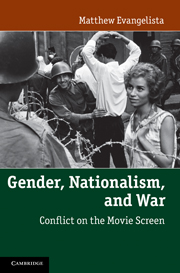Crossref Citations
This Book has been
cited by the following publications. This list is generated based on data provided by Crossref.
2011.
Publications Received.
Contemporary Sociology: A Journal of Reviews,
Vol. 40,
Issue. 5,
p.
650.
Sharpe, Mani
2015.
Representing masculinity in postcolonial Algerian cinema.
The Journal of North African Studies,
Vol. 20,
Issue. 3,
p.
450.
Loska, Krzysztof
2015.
„Bitwa o Algier” – narodziny dyskursu postkolonialnego.
Kwartalnik Filmowy,
p.
254.
Evangelista, Matthew
2015.
Paradoxes of Violence and Self-determination.
Ethnopolitics,
Vol. 14,
Issue. 5,
p.
451.
McDermott, Rose
2015.
Sex and Death: Gender Differences in Aggression and Motivations for Violence.
International Organization,
Vol. 69,
Issue. 3,
p.
753.
Harrison, Rebecca
2016.
The Coming of the Projectionettes.
Feminist Media Histories,
Vol. 2,
Issue. 2,
p.
47.
Roβmann, Sabine
2016.
Eastern European Youth Cultures in a Global Context.
p.
202.
Kardaş, Tuncay
and
Yesiltaş, Murat
2017.
Rethinking Kurdish geopolitical space: the politics of image, insecurity and gender.
Cambridge Review of International Affairs,
Vol. 30,
Issue. 2-3,
p.
256.
Clément, Maéva
Lindemann, Thomas
and
Sangar, Eric
2017.
The “Hero‐Protector Narrative”: Manufacturing Emotional Consent for the Use of Force.
Political Psychology,
Vol. 38,
Issue. 6,
p.
991.
Sangar, Eric
Clément, Maéva
and
Lindemann, Thomas
2018.
Researching Emotions in International Relations.
p.
179.
Ostrowska, Elżbieta
2018.
Bodily Violence and Resistance in Wojtek Smarzowski’s Rose (Róża, 2011).
Baltic Screen Media Review,
Vol. 6,
Issue. 1,
p.
38.
Lazarev, Egor
2019.
Laws in Conflict: Legacies of War, Gender, and Legal Pluralism in Chechnya.
World Politics,
Vol. 71,
Issue. 04,
p.
667.
Efthymiou, Stratis Andreas
2019.
Nationalism, Militarism and Masculinity in Post-Conflict Cyprus.
p.
1.
Baruah, Trisha Dowerah
2020.
Handbook of Research on Social and Cultural Dynamics in Indian Cinema.
p.
102.
Irawanto, Budi
2020.
Southeast Asia on Screen.
Efthymiou, Stratis Andreas
2023.
Nationalismus, Militarismus und Männlichkeit im Nachkriegs-Zypern.
p.
1.
Karim, Sabrina
and
Hill, Jr., Daniel W
2024.
Positioning Women in Conflict Studies.



